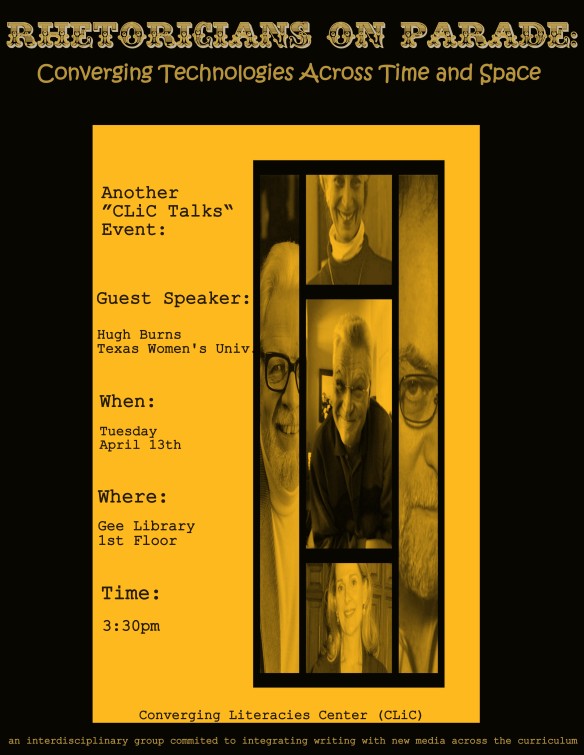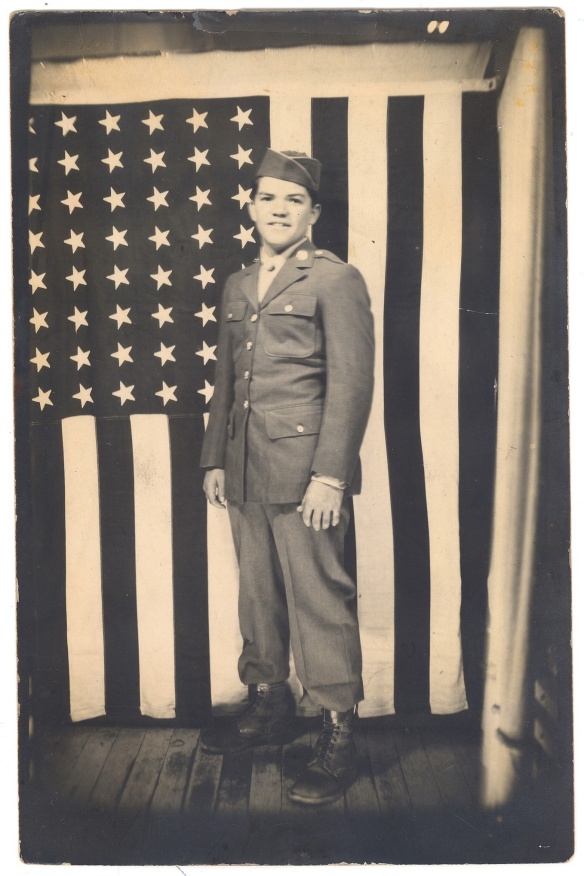April 13, 2010, 3:30, Gee Library, Texas A&M-Commerce
Hugh Burns, Professor of English and Rhetoric (TWU)
US Air Force Officer turned English Professor offers public lecture on emerging technologies, contributes recordings from 1999 speaker series with the field’s top rhetoricians to National Conversation on Writing (NCoW)

[Commerce, Texas]–Tuesday, April 13, 2010, the Converging Literacies Center (CLiC) will help kick off National Library Week at Texas A&M-Commerce with a speaker event, the second in their new series “CLiC Talks.” Presentation by rhetoric and technology scholar Professor Hugh Burns (Texas Woman’s University) begins at 3:30, on the first floor of Gee Library on the Texas A&M-Commerce campus. At the event, Burns will contribute recordings of lectures with key rhetoricians to the National Conversation on Writing (NCoW), a digital collection of oral histories, lectures and other artifacts about writing and writers. The contribution itself, coupled with the lecture, brings together technology with archival work in deep collaboration with the Library–providing yet another example of the ways in which “Communities Thrive @ the Library” (National Library Week theme)
A retired Lieutenant Colonel in the US Air Force with a background in Artificial Intelligence research and software design, this Professor of English and Rhetoric offers a unique perspective for CLiC’s ongoing investigation of emerging technologies. In fact, Burns’ 1979 dissertation (PhD in Rhetoric, University of Texas) broke new ground by combining composition instruction with artificial intelligence research to create a program that would eventually lead to the award-winning education platform Daedalus Integrated Writing Environment (DIWE). As he heard more than once when writing (designing?) his dissertation, “That’s not a book, Burns. That’s software!” In the last thirty years, Professor Burns has responded to increasingly rapid changes in composition and rhetoric through rigorous research in rhetorical invention and what he calls the “discovery and recovery of ideas.” For the last twenty years, the annual Hugh Burns Dissertation Award has recognized the best dissertation in the field of computers and composition.
And in 1999, Burns turned a graduate seminar at Texas Woman’s University into what he affectionately called “Rhetoricians on Parade.” Between January and May 1999, nine of the top scholars in rhetoric and technology traveled to Denton to present lectures (free and open to the public): Andrea Lunsford (Stanford) on women in the history of rhetoric (Reclaiming Rhetorica 1995), Wayne Booth (University of Chicago) on the rhetoric of fiction (Rhetoric of Fiction 1983), Martin Carmargo (University of Illinois) on medieval rhetoric in poetics (Medieval Rhetorics of Prose Fiction, 1995), Cheryl Glenn (Penn State) on feminist rhetoric (Rhetoric Retold 1999; Unspoken 2004). James Kinneavy (University of Texas) on twentieth-century rhetoric (A Theory of Discourse 1971), Michael Joyce (Vassar) on what was then called “hypertext fiction” (Liam’s Going, 2002; Sister Stories 2000; Twilight 1996), Shirley Wilson Logan (University of Maryland) on African American Rhetoric (Liberating Language, 2008; “We Are Coming,” 1999; With Pen and Voice, 1995), Winifred Bryan Horner (Texas Christian University, Emeritus) on 18th and 19th Century Scottish Rhetoric (Nineteenth-Century Scottish Rhetoric, 1992; The Present State of Scholarship in the History of Rhetoric, 2009), and C. Jan Swearingen (Texas A&M) on rhetoric and religion (Rhetoric, the Polis, and the Global Village, 1999, Rhetoric and Irony, 1991). Each visiting rhetorician also lead a seminar of 10 MA and PhD students
Visiting Scholar Winifred Horner led this important lecture series of graduate seminars, coordinated by Professor Burns and Horner’s regular collaborator Suzanne Webb (Texas Woman’s University).
With his generous contribution, Burns makes these historic lectures available to the general public–for the first time in more than ten years. Join us at 3:30 in the Gee Library for a presentation that brings together rhetoric, technology, and the importance (and difficulty) of preserving new media for future generations of students and researchers.
In his presentation entitled “Rhetoricians on Parade: Converging Technologies Across Time and Space,” Burns offers the context and goals for the lecture series and original plans for remediating recorded lectures for future researchers (transcriptions and other means). He will be joined by Shannon Carter (Associate Professor of English at Texas A&M-Commerce) who was a student in this 1999 seminar. As student involved in original project and current Co-Director of the Converging Literacies Center, Carter offers yet another perspective on emerging technologies as represented among users involved with the “Rhetoricians on Parade” lecture series.
The contribution to the National Conversation on Writing (NCoW) will occur during this presentation. NCoW is housed at Texas A&M-Commerce and managed by CLiC in collaboration with Gee Library. Director of Libraries Gregg Mitchell will be present to receive gift.
After presentation, will be the unveiling of a multimedia installation coordinated by CLiC. Posters, video, and other modalities introducing research projects undertaken by current PhD students exploring rhetoric in everyday, contexts. Installation will be displayed throughout National Library Week.
Additional information available at http://www.convergingliteraciescenter.wordpress.com
Contacts:
Shannon Carter, Associate Professor of English, Texas A&M-Commerce
 CLiC Talk
CLiC Talk
![melbatheater[1]](https://convergingliteraciescenter.files.wordpress.com/2011/02/melbatheater1.jpg?w=584)
![huffcreekroad_photo[1]](https://convergingliteraciescenter.files.wordpress.com/2011/02/huffcreekroad_photo1.jpg?w=584)




